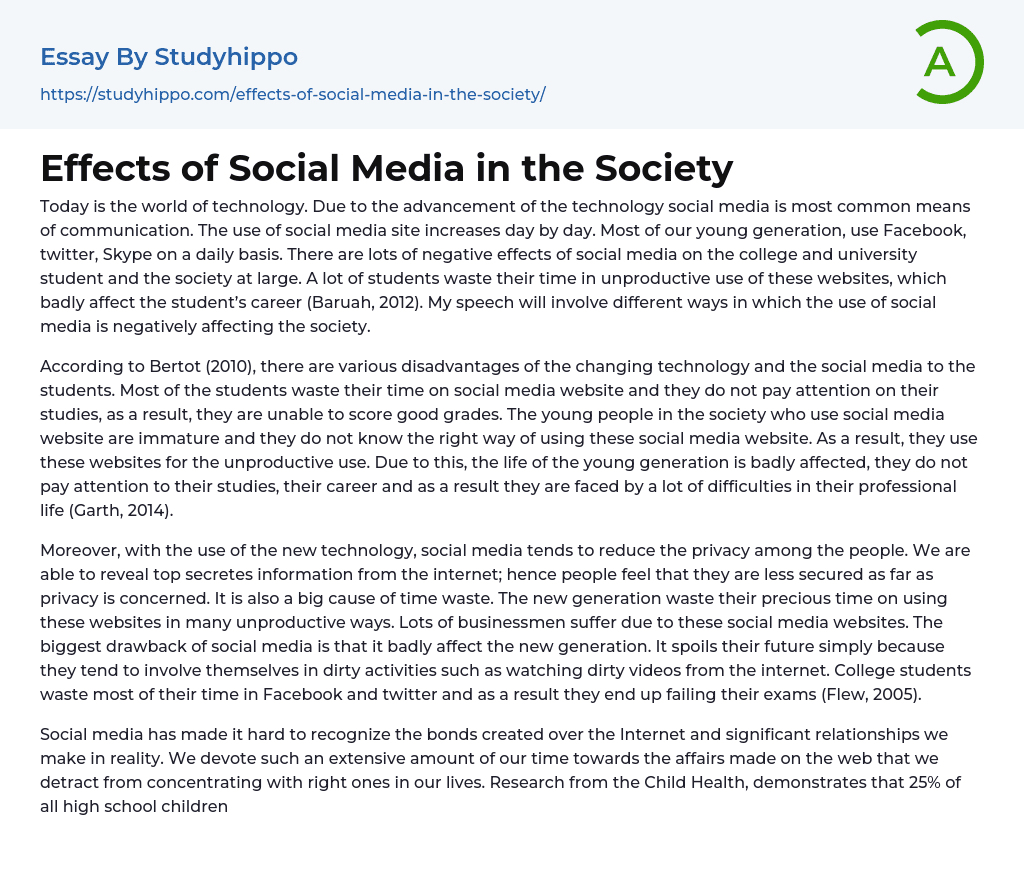Technology has become an essential aspect of our daily lives, with social media emerging as a prevalent communication method. Platforms such as Facebook, Twitter, and Skype are particularly popular among young people. Nevertheless, the excessive utilization of these websites has adverse effects on college students, university students, and society overall. Numerous students waste significant amounts of time on these platforms, which ultimately obstructs their academic and professional development (Baruah, 2012).
Discussing the negative impact of social media on society, Bertot (2010) highlights how students face disadvantages due to changing technology and their use of social media. Many students spend too much time on these platforms instead of focusing on their studies, resulting in lower grades. Furthermore, young individuals who utilize social media often lack maturity and knowledge about proper usage, leading them to engage in unproductive activities. Consequently, this gre
...atly affects the younger generation as they neglect their studies and future careers, causing numerous difficulties in their professional lives (Garth, 2014).
Moreover, the adoption of new technology has resulted in a decline in privacy via social media. This is apparent as individuals can effortlessly obtain extremely confidential information online, leading to a diminished feeling of security concerning their privacy. Furthermore, social media significantly contributes to the squandering of time, especially among youths who frequently use these platforms unproductively. Additionally, various businesses encounter adverse outcomes due to the influence of these social media websites. Ultimately, the foremost drawback of social media is its harmful effect on the younger generation.
Engaging in inappropriate activities such as watching explicit videos online has a detrimental impact on the future of college students, leading to academic failure (Flew, 2005). The extensive use of
Facebook and Twitter by these individuals results in a significant waste of time. This excessive involvement with social media makes it challenging to differentiate between virtual connections and genuine real-life relationships. Consequently, we often neglect the crucial relationships that truly matter. Research conducted by Child Health reveals that social networking contributes to depression among 25% of high school students.
As social media usage increases, the number of young people experiencing unhappiness will also rise (Garth, 2014), leading to emotional, physical, and mental issues in society. The impact of technology is global rather than limited to a specific country or nation. Social networking's widespread popularity has influenced productivity levels, privacy concerns, cyber bullying, and communication on the internet. Parents must act now to protect their children from social media if they want a better future for this and future generations. Instead of waiting passively for change, be the catalyst for change.
References
- Baruah, T. D. (2012). Effectiveness of Social Media as a tool communication . International Journal of Scientific and Research Publications, 2250-3153.
- Bertot, J. C. (2010). social media technology and government transparency. .
Compute, 53-59.
Introduction to new media: An introduction by Oxford University Press.




